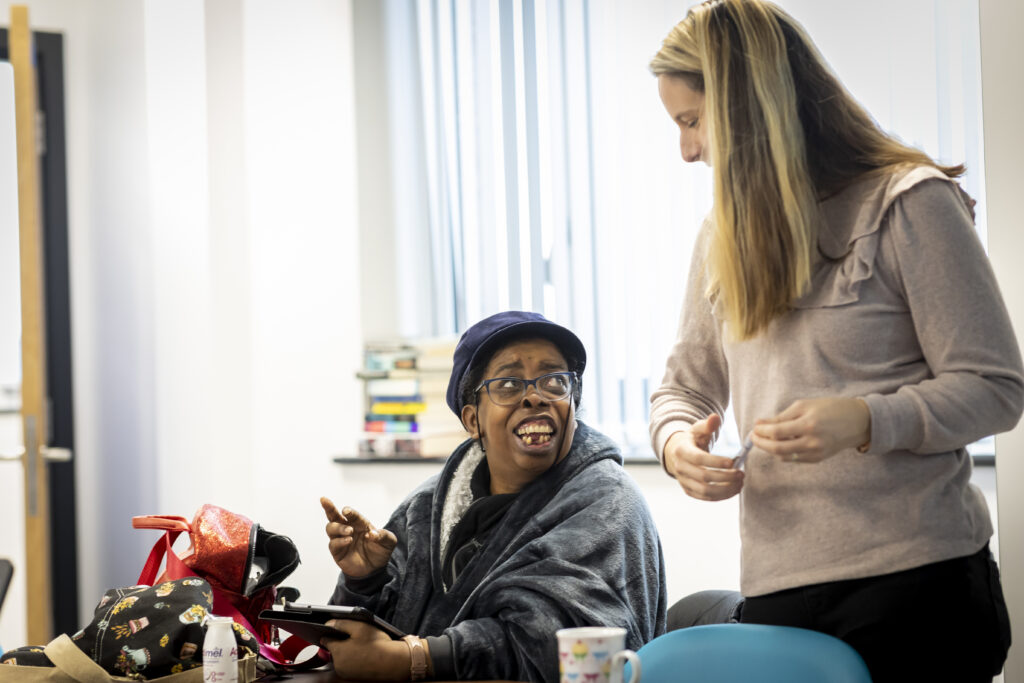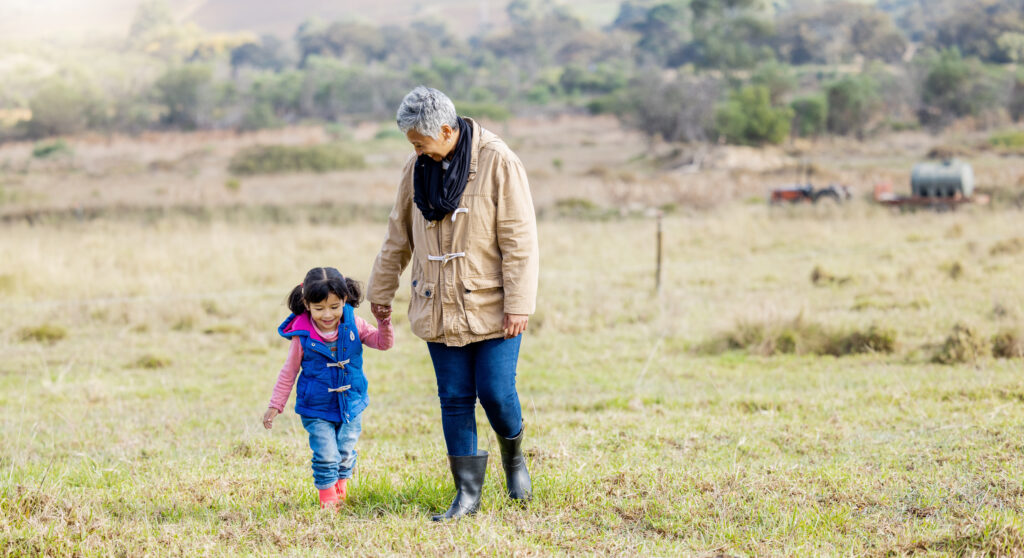Older women and caregiving
Many older women spend a lot of their time looking after others, both within and outside their homes. In fact, a recent survey shows that women in Australia do about 9 more hours of unpaid work and care each week than men (31.6 hours compared to 22.4 hours).
And the time spent in unpaid work is highest for women aged 55 – 64 years: over a quarter of women in this age group look after family outside their own home. This is much more than men of the same age.
Unpaid caregiving by women is valued at roughly half of Australia’s total economic production – a huge contribution to our society.
Reports show that women from migrant and refugee communities spend even more time caring for older family members. There are a number of reasons for this. One is that there aren’t many aged care services that accommodate people from different cultures.
Plus, older women from these groups might not speak English well, may feel isolated from the wider community, may not know how to find support – or may prefer to provide care at home. You can read this Multicultural Centre for Women’s Health report for more on this.
Caring for others can be rewarding and bring joy. It can make relationships stronger, especially between different generations. But it can also be tough. Older women who care for others often don’t look after ourselves enough. We may feel more anxious or depressed than others.

It’s especially hard to be looking after both kids and older family while holding a paid job. So, there’s a big need within our society for more support for people with caring responsibilities, and for those responsibilities to be shared more equally.
National Carers Week is important because more people need to be aware of how important the carer’s job is – a lot of people don’t understand the toll it takes both physically and emotionally and mentally. It’s really important that carers get some help so they can have a little bit of time to themselves so that they’re recharged ready to look after their loved one better.
Lorraine’s Story, National Carers Week 2021
Carers Australia and the Carer Gateway provide wonderful support services for carers, including help in the home for those caring for family members. In this video, Michelle talks about how helpful Carers Australia was in supporting her to care for her father when he developed dementia.
Caring for grandchildren
Caring for grandchildren brings many grandparents great joy. It’s also important to acknowledge that it can come with challenges. If grandparents are providing financial support or if caregiving makes it harder to do paid work, caring for grandchildren can be financially stressful.
And the work that grandmothers in particular take on can really add up, especially when combined with caring for others, such as partners or children. As women, we can often find ourselves putting the needs of our children, partner and grandchildren before our own.
In fact, some people might not even want to take on regular care of grandchildren, while still wanting to spend time with them frequently. Being asked to provide regular care of grandchildren can bring up a range of different feelings in different people, all of which are normal and valid.

The Raising Children Network has great advice on how to approach the conversation about caring for grandchildren with your own kids. If you do decide to provide regular care, some tips on how to plan for this include:
- Be clear about what you can and can’t do.
- Plan for sickness and holidays from the start.
- If you work, be clear with your adult children about your work commitments.
- If you can’t help with childcare, you may like to offer to help with organising other care options.
- If you’re looking after your grandchild in your own home, think about rules that will make it easier for you.
- If looking after your grandchild late at night is affecting your rest, consider staying at their house overnight or having your grandchild sleep over at your house.
Caring for family members with a disability
Recent numbers from the Australian Bureau of Statistics (ABS) show that in 2018, women were more likely to be the main caregivers for someone with a disability. In fact, 7 out of every 10 main caregivers were women, and were 54 years old on average. The largest group of women caregivers were those aged between 55 and 64.
The ABS also found that being a main caregiver can bring many changes to a person’s life. For example, caregiving can make it hard to earn as much money, which might mean it’s more difficult to find a good place to live. Services Australia has information for caregivers about payments they might be able to get to help with costs.
You can also visit the Australian Government’s Disability Gateway. This website has details for caregivers.
Another helpful site is the Carer Gateway, which gives advice on different kinds of help available like short breaks, talking to others in similar situations, counselling, learning sessions, and personalised help packages.
And finally, there’s a program called the Peer Conversations Program. It connects caregivers to others who can give tips and advice, including help with NDIS. To learn more, watch the video above.
Want more information? These resources may help
- Carers Australia and the Carer Gateway offer support for carers
- Visit the My Aged Care website for more information about caring for someone with specific needs, either at home or in an aged care home.
- You can also look up your state- or territory-based carer support organisation (such as Carers NSW).
Choi NG, Ha JH (2016) Relationships between spouse/partner support and depressive symptoms in older adults: Gender difference. Aging and Mental Health Aging Ment Health 15(3), 307–317.
Ewings SJ (2019) Unique challenges facing older Australian women in the early twenty-first century. The University of Sydney.
Farrugia T, Hewitt A, Bourke-TH, Joosten A (2019) The impact of carer status on participation in healthy activity and self-reported health among Australian women over 50 years. Australian Occupational Therapy Journal. 66(1): 23–32.
Feldman S, Radermacher H (2019) Vital conversations: giving older women in greater Melbourne a voice. Lord Mayor’s Charitable Foundation, Melbourne.
Fuller H, Pikala T, Mullen A (2022). Strengthening late-life family connections. North Dakota State University.
Guven S, Sener A (2010). Family relations in aging. International Journal of Business and Social Science 1(3).
Haslam C, Dane S, Lam BCP, Jetten J, Liu S, Gallois C, et al. (2022) Ageing well in a foreign land: group memberships protect older immigrants’ wellbeing through enabling social support and integration. Ageing And Society. 42(7), 1710-1732.
Lixia Q, Kaspiew R, Carson R, De Maio D, Harvey J, Horsfall B (2021) National elder abuse prevalence study: Final report . Australian Institute of Family Studies.
Luong G, Charles ST, Fingerman KL (2011) Better with age: Social relationships across adulthood. Journal of Social and Personal Relationships 28(1), 9–23.
Mohanty I, Niyonsenga T, Cochrane T. et al. (2020) A multilevel mixed effects analysis of informal carers health in Australia: the role of community participation, social support and trust at small area level. BMC Public Health. 20(1801).
MCWH (2021) Submission into the Inquiry into Support for Older Victorians from refugee and migrant backgounds. Multicultural Centre for Women’s Health, Melbourne.
Pope ND (2022) Older women caring for others and needing care. Journal of Women and Ageing 34(6), 687-691.
Sharma N, Chakrabarti S, Grover S (2016) Gender differences in caregiving among family - caregivers of people with mental illnesses. National Centre for Biotechnology Information.
Thomas PA, Liu H, Umberson D (2017) Family relationships and well-being. Innovation in Ageing 1(3).